 One of the dilemmas faced by actresses at the edges is the not infrequent ease with which deft, complicated work in direct service of the larger work can be overlooked as "obvious" or "unremarkable" -- the performance considered a non-performance, in part, precisely because the supporting player had played their part so well. Only when the piece is remade or revived does it become clear how essential -- and essentially difficult -- that particular role is to get right. To my mind, performances like these are the stealth superstars of the category, easy to dismiss in favor of showier gratifications yet surprisingly difficult to forget in our casual remembrances of the larger work. (I worry, sometimes, that these are the performances that also suffer most in the transfer to our smaller screens.) Such is this week's featured performance -- the final nominated performance for 2008 -- by an actress who's always doing a lot more than it first appears. Of course, I'm talking about...
One of the dilemmas faced by actresses at the edges is the not infrequent ease with which deft, complicated work in direct service of the larger work can be overlooked as "obvious" or "unremarkable" -- the performance considered a non-performance, in part, precisely because the supporting player had played their part so well. Only when the piece is remade or revived does it become clear how essential -- and essentially difficult -- that particular role is to get right. To my mind, performances like these are the stealth superstars of the category, easy to dismiss in favor of showier gratifications yet surprisingly difficult to forget in our casual remembrances of the larger work. (I worry, sometimes, that these are the performances that also suffer most in the transfer to our smaller screens.) Such is this week's featured performance -- the final nominated performance for 2008 -- by an actress who's always doing a lot more than it first appears. Of course, I'm talking about...

...Amy Adams in Doubt (2008)
approximately 48 minutes and 25 seconds
22 scenes
roughly 45% of film's total running time
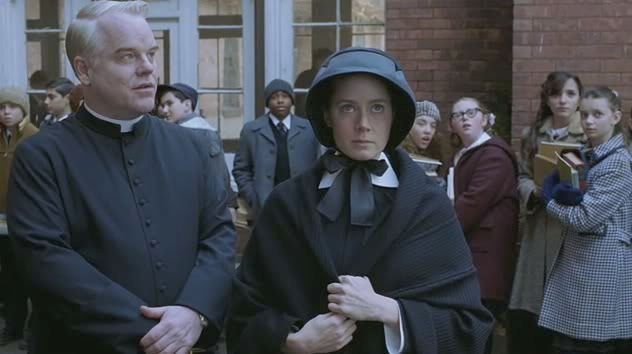 When she informs her Mother Superior (Meryl Streep) of her uncertainties, Adams's Sister James quickly finds herself at the center of a titanic war of clerical ego. At the same time, Adams's Sister James experiences new tests to the clarity of her faith.
When she informs her Mother Superior (Meryl Streep) of her uncertainties, Adams's Sister James quickly finds herself at the center of a titanic war of clerical ego. At the same time, Adams's Sister James experiences new tests to the clarity of her faith. The role of Sister James is perhaps the trickiest in this chamber piece.
The role of Sister James is perhaps the trickiest in this chamber piece.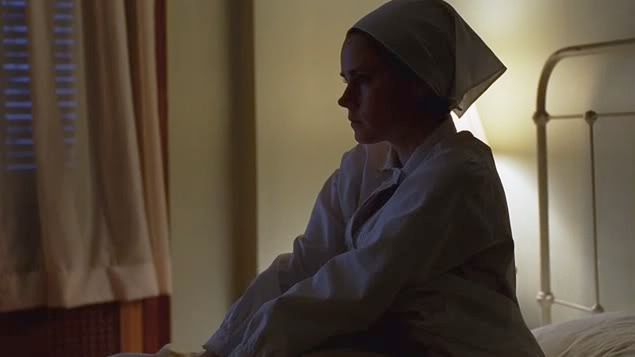 The role obliges simplicity without stupidity, purity without pretension. In order for the narrative to work, there must be no insinuation that Sister James forwards her allegations in service of any personal motives.
The role obliges simplicity without stupidity, purity without pretension. In order for the narrative to work, there must be no insinuation that Sister James forwards her allegations in service of any personal motives.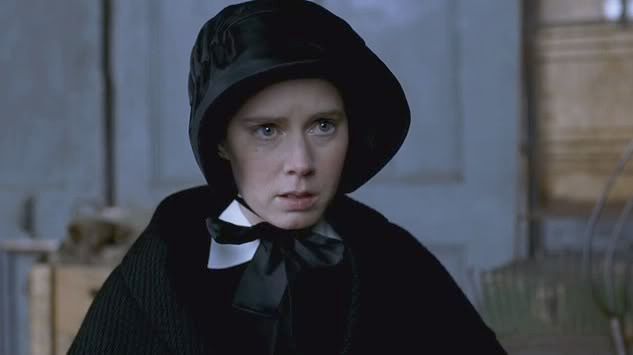 At the same time, Sister James -- as the audience's putative surrogate -- must maintain a constancy of character even as she changes her mind, in some way, in nearly every scene. She animates the central emotional tension within the piece and, without the character's clarifying presence, the other three horses in this four horse team might really run amuck.
At the same time, Sister James -- as the audience's putative surrogate -- must maintain a constancy of character even as she changes her mind, in some way, in nearly every scene. She animates the central emotional tension within the piece and, without the character's clarifying presence, the other three horses in this four horse team might really run amuck.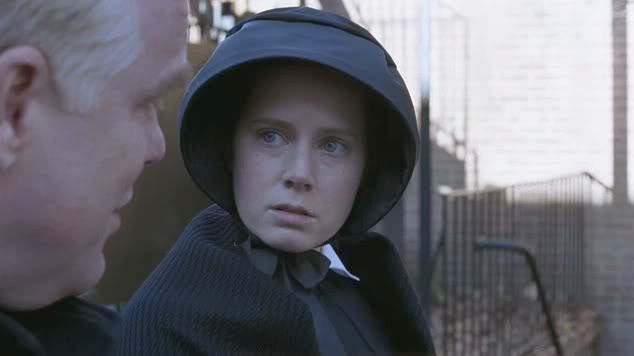 In short, the character of Sister James must embody both the sincerest doubt and also the sincerest faith. And, I would submit, the character of Sister James is probably the hardest character in this piece to get precisely right.
In short, the character of Sister James must embody both the sincerest doubt and also the sincerest faith. And, I would submit, the character of Sister James is probably the hardest character in this piece to get precisely right. And, in my view, Amy Adams does just that -- she gets this role right.
And, in my view, Amy Adams does just that -- she gets this role right.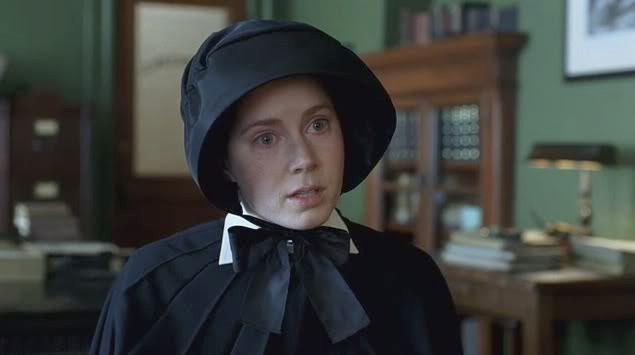 Adams's gift for conveying sweetness melds with her knack for revealing her character's easily overlooked depths and, in so doing, the actress accomplishes a near perfect performance in Doubt's trickiest role.
Adams's gift for conveying sweetness melds with her knack for revealing her character's easily overlooked depths and, in so doing, the actress accomplishes a near perfect performance in Doubt's trickiest role.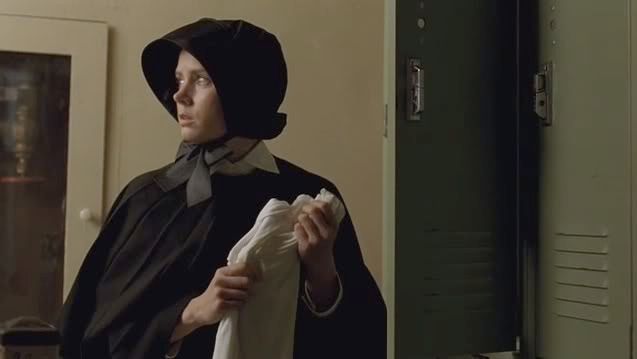 What I find most impressive about Amy Adams's performance, however, is how keenly the actress tunes into something that is at first quite elusive about the character. If Sister James is not merely a plot device -- merely in service to the required action of the story -- then who is she? It seems to me, and this may just be me, that Sister James's plot functions -- her biggest scenes are often in service to the arcs of the other characters -- signal that she embodies the clarifying constant shared by all of the characters in the piece: the instinct of service, or the desire to do the right thing. When I think of Amy Adams in the role, I'm haunted most by three images (for which, alas, I do not yet have screencaps): first, the moment when Adams's Sister James takes the hand of Alice Drummond's Sister Veronica in the early morning; next, when Adams's Sister James takes a tearful Jimmy Hurley (deftly portrayed by Lloyd Clay Brown) into her arms after harshly reprimanding him in class; and finally, when Adams's Sister James lays her cheek on the lap of Meryl Streep's Sister Aloysius in the final tableau of the film. In each of these three moments, there's a fleeting moment of hesitation, a millisecond of pause in which Adams's Sister George seems to decide to place the needs of this other character ahead of her own. The other characters may be facing more dramatic choices -- to stand in service of tradition, of the church's future, of the safety of a beloved son -- but it seems to me that Amy Adams astutely understands the quiet drama inside Sister James, discerning and conveying the constant conflict between self and service that seems to define a religious vocation.
What I find most impressive about Amy Adams's performance, however, is how keenly the actress tunes into something that is at first quite elusive about the character. If Sister James is not merely a plot device -- merely in service to the required action of the story -- then who is she? It seems to me, and this may just be me, that Sister James's plot functions -- her biggest scenes are often in service to the arcs of the other characters -- signal that she embodies the clarifying constant shared by all of the characters in the piece: the instinct of service, or the desire to do the right thing. When I think of Amy Adams in the role, I'm haunted most by three images (for which, alas, I do not yet have screencaps): first, the moment when Adams's Sister James takes the hand of Alice Drummond's Sister Veronica in the early morning; next, when Adams's Sister James takes a tearful Jimmy Hurley (deftly portrayed by Lloyd Clay Brown) into her arms after harshly reprimanding him in class; and finally, when Adams's Sister James lays her cheek on the lap of Meryl Streep's Sister Aloysius in the final tableau of the film. In each of these three moments, there's a fleeting moment of hesitation, a millisecond of pause in which Adams's Sister George seems to decide to place the needs of this other character ahead of her own. The other characters may be facing more dramatic choices -- to stand in service of tradition, of the church's future, of the safety of a beloved son -- but it seems to me that Amy Adams astutely understands the quiet drama inside Sister James, discerning and conveying the constant conflict between self and service that seems to define a religious vocation.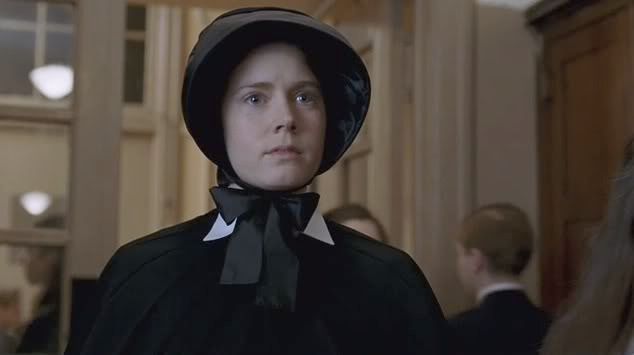 All of which is to say that I consider Amy Adams's performance in Doubt to be one of the most astute and insightful performances I've paid attention to this year.
All of which is to say that I consider Amy Adams's performance in Doubt to be one of the most astute and insightful performances I've paid attention to this year.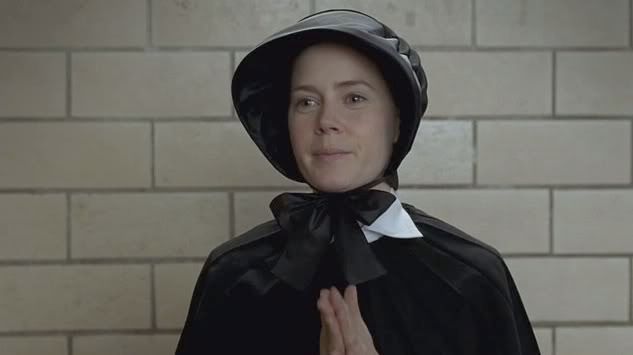 I may not have "loved" it quite as much as this or that other performance. But I nonetheless think it's one of the most accomplished supporting performances of this or any year.
I may not have "loved" it quite as much as this or that other performance. But I nonetheless think it's one of the most accomplished supporting performances of this or any year.

No comments:
Post a Comment